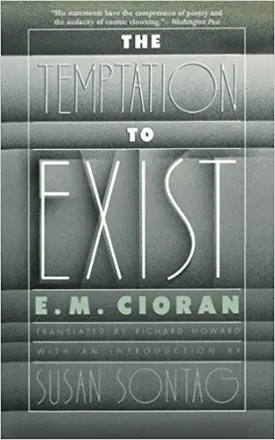E. M. Cioran
E. M. Cioran was a Romanian philosopher, essayist and noted aphorist. He was born in Răşinari, Romania in 1911 and died in Paris, France in 1995. His work ranges across a diverse array of topics, including the nature of existence, asceticism, religion, irony and aesthetics. While not particularly well-known outside philosophical circles, Cioran has had a lasting influence on modern thought, with his ideas often pointing towards nihilism and pessimism. He was highly regarded by fellow philosopher Jean-Paul Sartre, who referred to him as “the greatest living philosopher in France.”
Cioran was born in Răşinari, Romania, and was the youngest of three children. He attended the schools at Sibiu and the University of Bucharest, where he majored in philosophy and Latin. While at university, he was influenced by existentialist thinkers such as Kierkegaard and Freud, and was an avid reader of philosophy, literature and theology. As a student, Cioran wrote several essays assessing the decline of European civilization and advocating for a new and more “mystical” civilization. This bled into many of his works, particularly those in which he discussed asceticism, death, and nihilism.
Cioran was conscripted into the Romanian Army during World War II and later served as a psychologist in the Romanian Air Force during the Soviet occupation of 1947. He later went on to become a lecturer in philosophy at the University of Cluj. During this time, he began to publish his writings, which were often dark, pessimistic and nihilistic in nature, tackling themes such as the human condition, suffering, existence, and mortality. He also held numerous lectures, in which he voiced his criticism of the Romanian government and argued against the communist regime, coming to public attention as a rebel and thought leader.
In the 1950s, Cioran left Romania to travel Europe, and eventually wound up in Paris, where he stayed for the rest of his life. It was during this period that he wrote some of his most acclaimed works. “The trouble with history,” Cioran wrote, “is that all its stories are the same: one generation succeeds another, and the same patterns of decline and fall, of joy and suffering, of riot and repression are repeated. No one could invent a new plot, so let us for the time being give up the effort of trying.”
Among his most notable works are The Temptation to Exist, Tears and Saints and A Short History of Decay. The Temptation to Exist is a collection of short, aphoristic meditations on existence and human experience, exploring concepts such as memory, language, death and despair. In it, Cioran starkly addresses his feelings of restlessness and vulnerability, and offers profound yet almost nihilistic insights into the human condition.
In Tears and Saints, Cioran advocates asceticism, focusing mainly on the renunciation of passion and the embrace of a life free from material desires. He laments the seductions of the world and desires readers to escape them so they don’t lose their essence.
Finally, A Short History of Decay is a series of reflections in which Cioran discusses the end of an era and his deep-seated dread of death, a prevailing theme in this work. He reflects not only on his own death but also about the death of entire civilizations and speaks about the idea of time itself being a death sentence, asking if life could be worth living in a world without transcendence.
In his lifetime, Cioran wrote over a dozen books of philosophy, gaining recognition as one of the most influential voices of the 20th century. His work reflected his personal journey of understanding and his melancholy view of the world, challenging the reader to think differently and pushing the boundaries of traditional thought. His dark, yet poetic works remain an inspiration to readers to this day, prompting introspection and reflection on the nature of existence.

